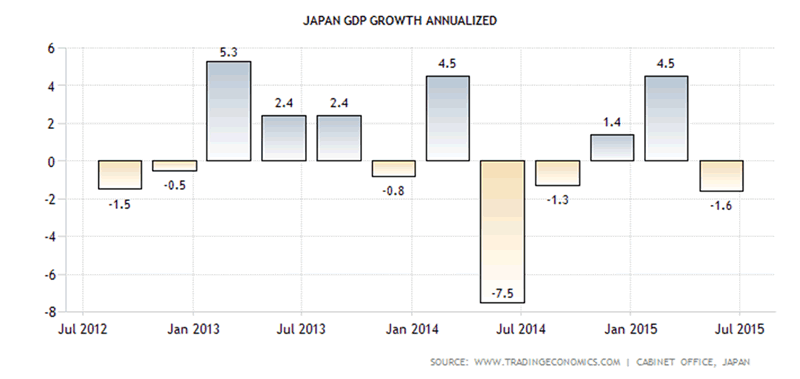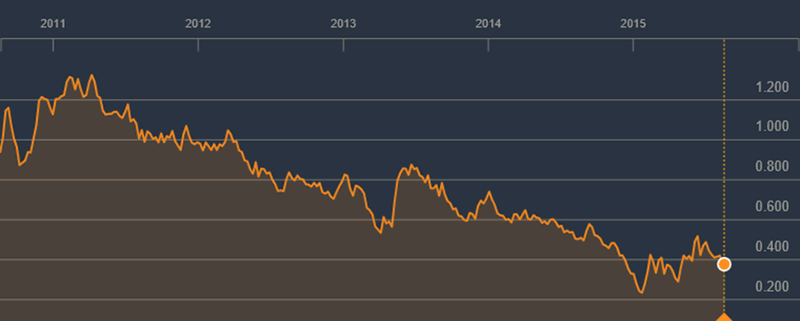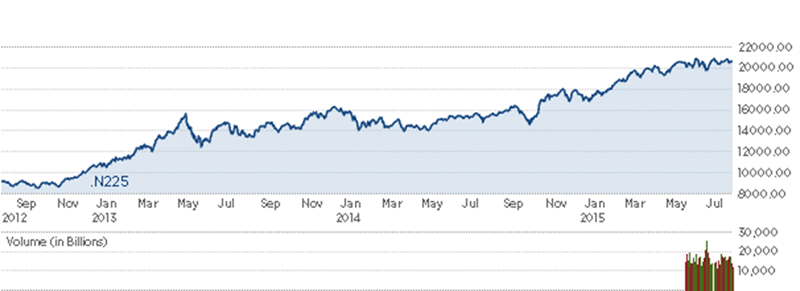Japan Economy Clear Conclusions Concerning QE
Economics / Japan Economy Aug 24, 2015 - 05:41 PM GMTBy: Michael_Pento
 Japan was recently slammed with more bad economic news; growth contracted yet again in the second quarter. Gross Domestic Product for the world’s third largest economy fell by an annualized 1.6% in the three months ended in June.
Japan was recently slammed with more bad economic news; growth contracted yet again in the second quarter. Gross Domestic Product for the world’s third largest economy fell by an annualized 1.6% in the three months ended in June.
The economic plan known as Abenomics, which promised massive money printing coupled with government spending would put the world's third largest economy on a path to sustainable growth, seems to have hit another roadblock. This latest contraction marks the third such set back since the optimistic launch of Abenomics at the end of 2012. Japan appears to be headed towards a triple dip recession.

As Japan’s economy has been struggling bond prices have soared and yields have crashed. But only because Japan’s Central Bank has been frantically buying JGB’s in a futile attempt to spur on growth. While it is true Abenomics has been hard pressed to reach its inflation targets, it is also a fact that the revenue needed to service Japan’s humongous and mounting debt mountain is quickly diminishing. Therefore, natural market forces should be pushing interest rates inexorably higher despite persistent deflation.
JGB 10 Year

All this money printing has also given a nice bid to the stock market; the Nikkei 225 has increased 100% during the reign of Abenomics, defying the notion that high stock valuations should be the product of strengthening economic growth that leads to rising earnings.

The ECB’s foray into QE provides more proof of the impotency of central banks to generate viable and robust GDP growth. In July of 2012, Mario Draghi promised to do “whatever it takes” to bring growth to the flailing European Union. To make sure his words don’t get lost in translation, in English this means print money and buy debt. After this promise, Europe saw another four quarters of contraction before growth emerged on the positive side. But that anemic growth rate has been stuck between the flat line and 1.6% ever since.
In fact, in the European Union’s latest Q2 data; Germany, France and Italy all posted weaker-than-forecast numbers, while growth in France registered at a nice round 0.0%.
Despite Draghi’s $67 billion a month worth of “whatever it takes” money printing, Eurozone GDP has barely moved off the flat line. Yet despite this, the German benchmark DAX is up 65% during the tenure of the ECB’s promise to keep bond yields in the zero-bound range. And Draghi’s quest to keep sovereign debt yields in a bubble has truly come to fruition—the German Ten-year Note yields just 0.6%.
And in our third case study of QE, let’s see how the US is faring after $3.7 trillion dollars of new Fed credit. Since the end of the Great Recession the US economy has been limping along at around a 2% growth rate, despite perpetual optimism that QE will bring growth to escape velocity. To illustrate how dead the US manufacturing sector has become, just this week the New York Fed's Empire State Index plummeted from 3.86 in July, to -14.92 in August, which was the lowest reading since April 2009.
The highly-accurate Atlanta Fed has 3rd quarter GDP tracking at an anemic 1.3%. Yet despite 7 years of sub-par growth, stocks as measured by the S&P are up 160% from their lows and bond yields are near all-time lows as well. Growth has been slow and is getting worse…and now stock prices are getting a huge wakeup call.
Time has provided three clear and indisputable conclusions about QE: QE pumps stocks to levels that are completely disconnected from the underlying fundamentals of an economy. It allows bond prices to soar and yields to drop to levels the free market could never accept. And perhaps most importantly, QE does not lead to robust economic growth. This is because whatever unsustainable job growth there is comes from the building and servicing of asset bubbles; while it also encourages further unsustainable debt accumulations. The US oil fracking industry is a perfect example this reality.
Central bank cheerleaders hold to the counterfactual that growth may have been worse if governments didn’t implement QE. But QE prevents the economy from truly healing because it keeps asset bubbles and debt levels from contracting. What you end up with is massive capital imbalances, increasingly unsustainable debt loads and financial asset inflation that sits on top of a crumbling economic foundation.
It is now becoming empirically obvious to any objective observer that the philosophy of money printing to generate growth is a complete failure. That bankrupt philosophy led to the biggest bubble of all: the QE-induced faith in central banks’ ability to save the world. The collapse of this deluded fantasy will be the most devastating reality check of all.
Michael Pento is the President and Founder of Pento Portfolio Strategies and Author of the book “The Coming Bond Market Collapse.”
Respectfully,
Michael Pento
President
Pento Portfolio Strategies
www.pentoport.com
mpento@pentoport.com
(O) 732-203-1333
(M) 732- 213-1295
Michael Pento is the President and Founder of Pento Portfolio Strategies (PPS). PPS is a Registered Investment Advisory Firm that provides money management services and research for individual and institutional clients.
Michael is a well-established specialist in markets and economics and a regular guest on CNBC, CNN, Bloomberg, FOX Business News and other international media outlets. His market analysis can also be read in most major financial publications, including the Wall Street Journal. He also acts as a Financial Columnist for Forbes, Contributor to thestreet.com and is a blogger at the Huffington Post.Prior to starting PPS, Michael served as a senior economist and vice president of the managed products division of Euro Pacific Capital. There, he also led an external sales division that marketed their managed products to outside broker-dealers and registered investment advisors.
Additionally, Michael has worked at an investment advisory firm where he helped create ETFs and UITs that were sold throughout Wall Street. Earlier in his career he spent two years on the floor of the New York Stock Exchange. He has carried series 7, 63, 65, 55 and Life and Health Insurance Licenses. Michael Pento graduated from Rowan University in 1991.
© 2015 Copyright Michael Pento - All Rights Reserved
Disclaimer: The above is a matter of opinion provided for general information purposes only and is not intended as investment advice. Information and analysis above are derived from sources and utilising methods believed to be reliable, but we cannot accept responsibility for any losses you may incur as a result of this analysis. Individuals should consult with their personal financial advisors.
Michael Pento Archive |
© 2005-2022 http://www.MarketOracle.co.uk - The Market Oracle is a FREE Daily Financial Markets Analysis & Forecasting online publication.



